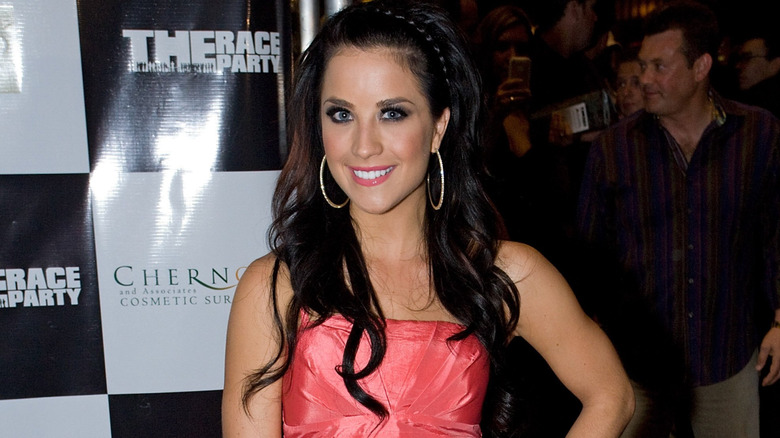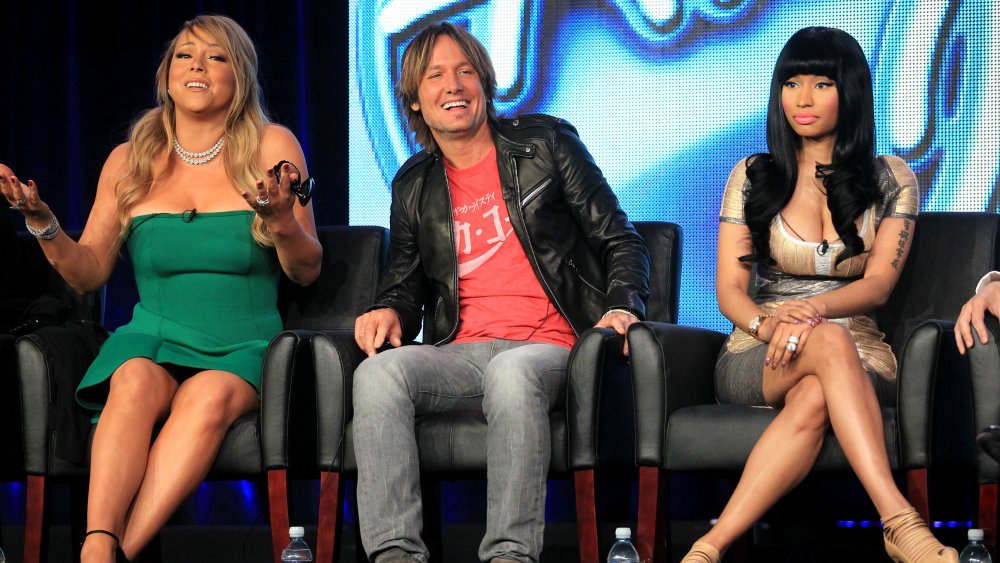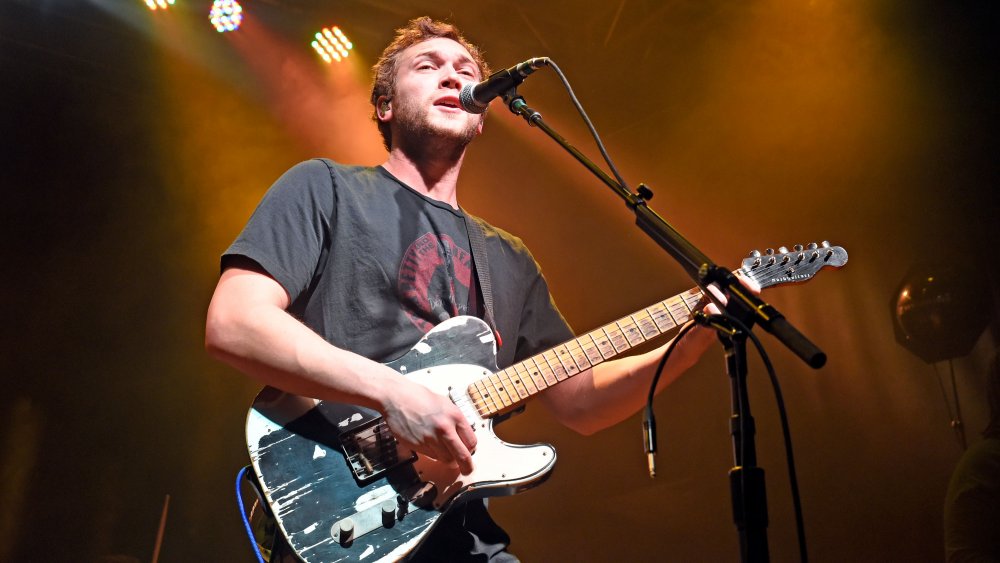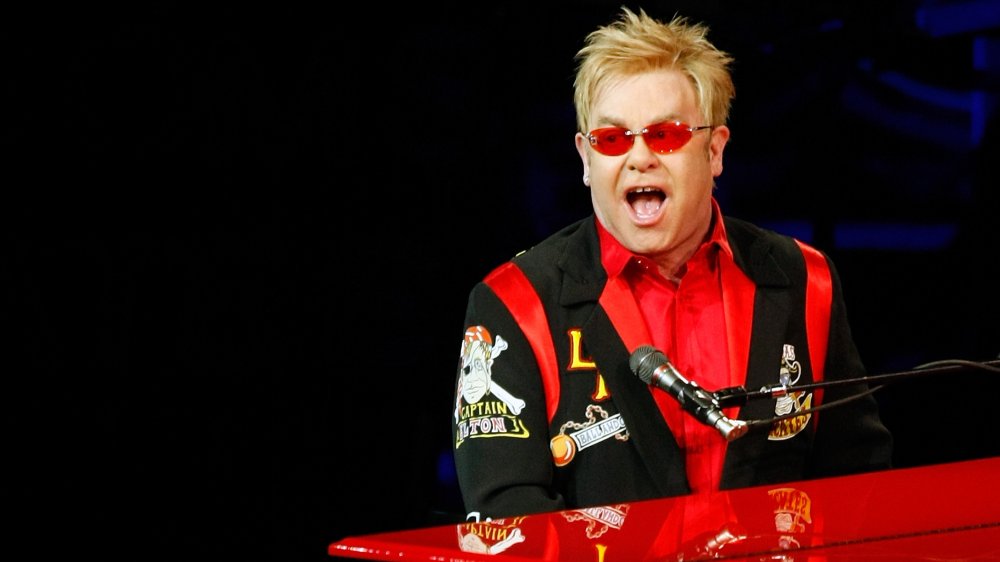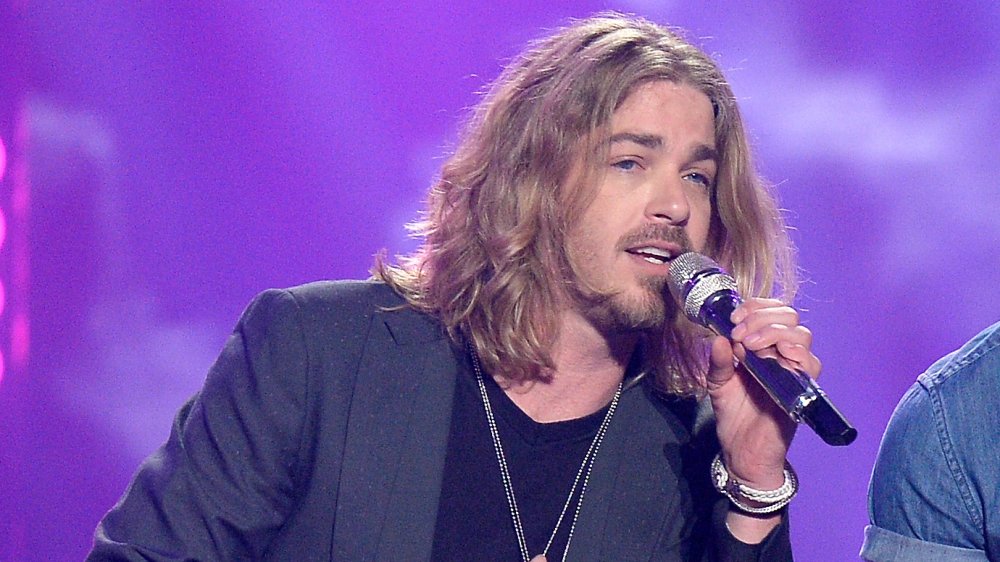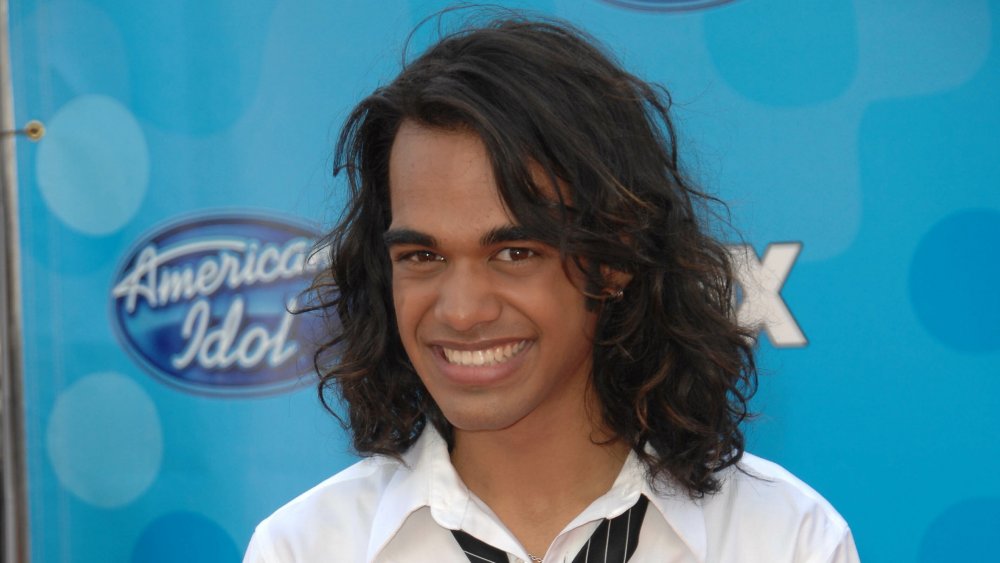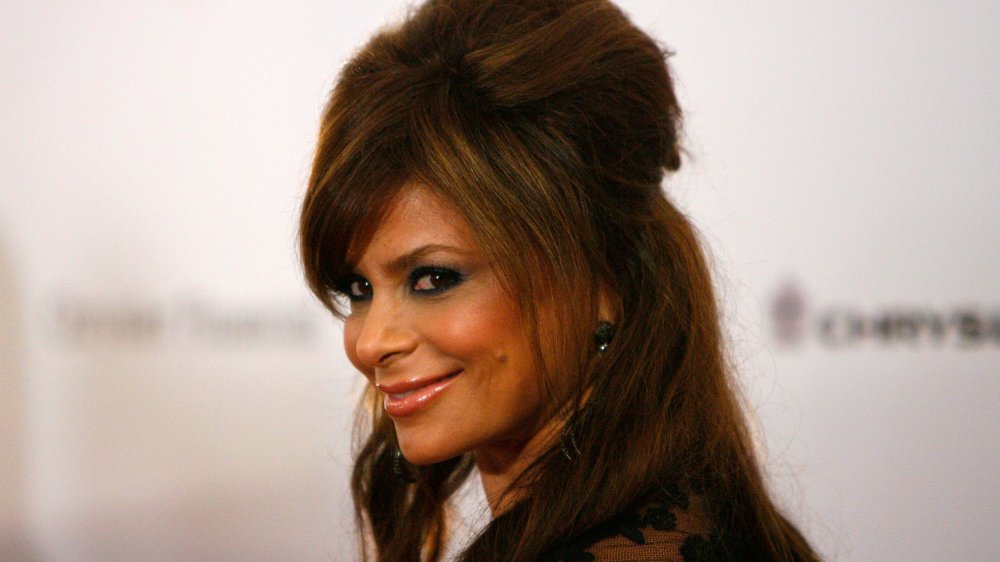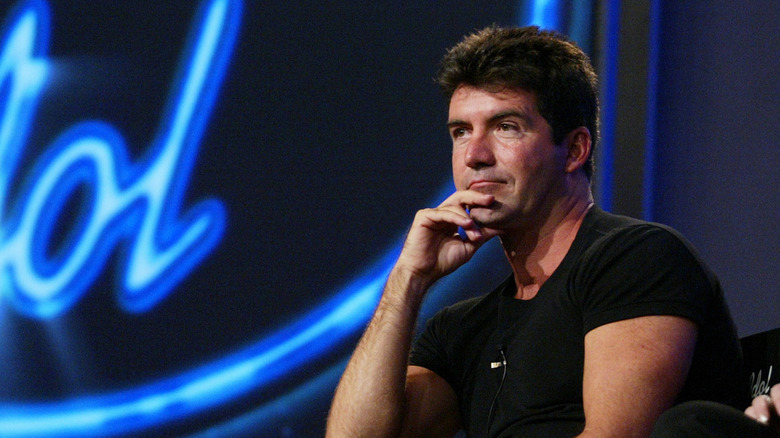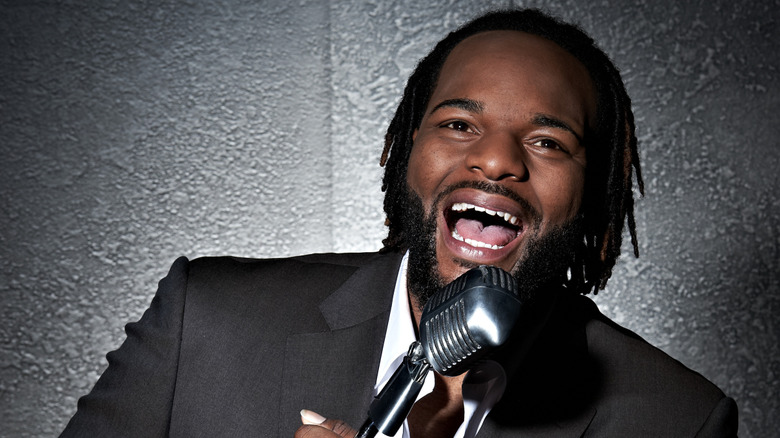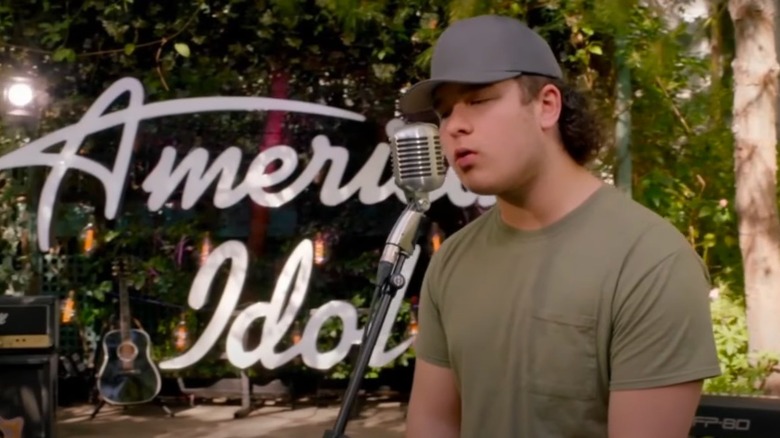Huge Scandals That Rocked American Idol
It's not hyperbole to say that "American Idol" changed the face of U.S. television. The concept behind the hit show is deceptively simple: wannabe singers audition in front of a group of judges, who critique their performances.
Over the course of more than two decades, the show has proven to be a bona fide launching pad for stars, including such names as Kelly Clarkson (the show's first-ever winner when she was just 20 years old), Carrie Underwood, Adam Lambert, Jennifer Hudson, and more. In fact, competing on the show and gaining exposure on national TV can help take a struggling singer to the next level, regardless of how far along in the competition they may get.
Yet the fame that can sometimes come from appearing on "Idol" is occasionally accompanied by scandal and controversy, something that's occurred consistently throughout the show's history. Keep that in mind as we dig into some huge scandals that rocked "American Idol."
Frenchie Davis was sent packing from American Idol after a topless photo scandal
The 2nd season of American Idol delivered its very first scandal, and it was a juicy one. The Smoking Gun website uncovered topless photos of contestant Frenchie Davis on an adult website called Daddy's Little Girls, which was believed to post photos of minors. Even though Davis claimed she was 18 when the pics were taken, her secret adult industry past — of which many mainstream actors also have – got her kicked off the show.
A few years later, Davis — who went on to land a role in Rent and become a legit Broadway star — called out "Idol" for its double standard when far more provocative photos surfaced of Season 6 contestant Antonella Barba, who was allowed to continue competing.
"I couldn't help but notice the difference between the manner in which she was dealt with and how I was dealt with," Davis griped to the New York Post. "I think it's fantastic if 'Idol' has evolved, and I think it's fantastic she won't have to go through what I went through four years ago ... but if the rules have changed, I believe there should be something to make up for the fact that I was humiliated needlessly."
Antonella Barba was sent to the slammer after her drug arrest
Antonella Barba may have avoided being turfed from Season 6 of "American Idol" after her nude photo scandal, but she didn't make it far. However, before her elimination, Barba earned a certain degree of notoriety from those pictures: the week her photos were leaked, Barba's name appeared in more online searches than Britney Spears.
In 2011, Barba made headlines when she was arrested for reportedly shoplifting. That, however, was just a warm-up for what took place in 2018, when she was arrested again, this time for allegedly distributing heroin (subsequent reports indicated it was actually a synthetic opioid). The following year, Barba was sentenced to nearly four years in prison after pleading guilty to possessing nearly two pounds of fentanyl.
Meanwhile, Barba's lawyer blamed "American Idol" for her downfall, becoming one of the many reality TV contestants who slammed the show they were on. According to NBC News, the singer's defense claimed she "not so long ago stood poised on the brink of a promising career as an entertainer, perhaps even stardom. Now, that has all but evaporated." Competing on "Idol", Barba's mother wrote in a letter, was "where it all went wrong," insisting her move to Hollywood after appearing on the show "was a recipe for disaster."
Paula Abdul denied having an affair with American Idol contestant Corey Clark
Corey Clark's time on "American Idol" was brief, with the singer kicked off in 2003 after The Smoking Gun shared details of his arrest for allegedly beating up his teenage sister. Even more controversy was in store when a tabloid (via 9 News) shared Clark's claims that he and judge Paula Abdul had a "secret affair" prior to his ejection.
According to the Season 2 contestant, he and Abdul allegedly had a sexual relationship while he lived in her guest house, but she warned him to keep his lips zipped. "Don't screw me or you'll be sorry," Abdul reportedly told him. Clark's claims, it should be noted, were taken from a book proposal he was shilling to publishing companies. Abdul denied everything, telling the tabloid she "disputes the allegations contained in the book proposal."
"Idol" producers took Clark's claims seriously enough to appoint an independent counsel. After a months-long investigation, no evidence was found to back up his allegations. "I'm grateful this ordeal is over, and I'm so looking forward to getting back to the job I love," Abdul said in a statement (via CBS News). "Once again, I thank my fans from throughout the world for their undying love and support."
Joanna Pacitti was disqualified from American Idol for being a pro
The entire premise of "American Idol" rests on the singers being undiscovered amateurs who are then propelled to stardom. Yet every once in a while, a contestant's past has blown this conceit to smithereens.
Such was the case with Season 8's Joanna Pacitti, who had pretty extensive music industry experience when she auditioned for the show. Not only did Pacitti's professional singing credits extend to childhood (she played the lead role in a national touring production of "Annie"), she already had a record deal and even released her debut album. Meanwhile, her songs had also appeared on movie soundtracks. As if that weren't enough, she also went on tour as the opening act for Nick Lachey — who was signed to a label owned by Sony BMG, the same company that awarded recording contracts to "American Idol" champions.
In order to eradicate any suggestion of unfairness to the season's other contestants, Pacitti was shown the door. "It has been determined that Joanna Pacitti is ineligible to continue in the competition," the show said in a statement (via Reuters). After her 2009 dismissal, Pacitti told Access, "It's devastating, but ... I've always been a strong believer that everything happens for a reason."
Mariah Carey's backstage battles with Nicki Minaj overshadowed the show
After longtime judges Paula Abdul and Simon Cowell exited "American Idol," OG judge Randy Jackson was joined by the star-studded combo of Keith Urban, Nicki Minaj, and Mariah Carey. It didn't take long for evidence to emerge that Carey and Minaj didn't get along — or, to be more accurate, despised each other with the searing force of a million suns.
That became clear when TMZ obtained a behind-the-scenes recording from the set. "I told them I'm not f**kin' putting up with her f**kin' highness over there," Minaj appeared to yell about Carey. "Oh why, why do I have a 3-year-old sitting around me?" Carey complained, to which Minaj succinctly replied, "I'm gonna knock you out." Minaj then allegedly upped the ante to declare off-tape, "If I had a gun I would shoot her." Minaj denied saying this.
Carey later told Barbara Walters she was so fearful of Minaj's alleged threats that she hired extra security. Nobody was surprised when neither singer came back for a second season of "Idol." After it was all over, Carey was asked during an interview if she'd ever return. "Hell no," she insisted on the Australian radio show, "Kyle and Jackie O" (via CNN). "Absolutely not. That was the worst experience of my life."
American Idol winner Phillip Phillips sued to escape an 'oppressive' contract
Phillip Phillips took the crown in "American Idol's" 11th season in 2012, but his elation at winning eventually withered when he took a closer look at his recording contract. In 2015, he sued the show's co-producer, 19 Entertainment, seeking to nullify his "oppressive" deal.
According to The Hollywood Reporter, the redundantly named singer-songwriter alleged he had so little control over the course of his career that he didn't even learn the name of his album, "Behind the Light," until it was announced. Phillips also claimed 19 Entertainment was helping itself to 40% of his endorsement money. As Phillips told THR, "I have not felt that I have been free to conduct my career in a way that I am comfortable with."
The case took an unexpected turn in 2016 when 19 Entertainment filed for bankruptcy during a different legal dispute (with "Idol" creator Simon Fuller) after Fox temporarily cancelled the show. That led 19 to countersue Phillips for $6 million, claiming he hadn't relinquished $1 million he owed the company, along with an additional $5 million for breaching his contract. The matter was settled in 2017, although details of that negotiation weren't made public. Perhaps these kinds of business dealings are part of the reason some "American Idol" winners basically disappear after their achievement.
Elton John blasted American Idol voting as 'incredibly racist'
Elton John briefly appeared on the 3rd Season of "American Idol" in 2004, and shared his opinion over a big voting scandal that took place when three of that season's most talented singers — Fantasia Barrino, LaToya London, and Jennifer Hudson, all of whom happened to be Black women — wound up in the bottom three.
During a press conference for an upcoming concert performance, Sir Elton slammed the racism he saw underlying the viewers' votes. "The three people I was really impressed with, and they just happened to be Black, young female singers, and they all seem to be landing in the bottom three," he said (via the Los Angeles Times). "They have great voices. The fact that they're constantly in the bottom three — and I don't want to set myself up here — but I find it incredibly racist."
The Fox network declined to comment on the matter. Meanwhile, Barrino went on to become that season's winner, London embarked on a successful career as an R&B singer, and Hudson is an EGOT winner, boasting a trophy case bursting at the seams with awards that include Grammys, an Emmy, a Golden Globe, an Oscar, a Tony, and more.
Bucky Covington used a Parent Trap trick to help his brother evade the law
Bucky Covington finished in 8th place in the 2006 season of "American Idol," but found himself in trouble with a law a few years later. In 2011, Covington was booked to perform in a Florida saloon when the show's promoter was taken to a hospital after experiencing chest pains.
According to the police report, when the promoter returned, he discovered $1,500 in cash was missing. He accused Covington and his twin brother, Rocky, of ripping him off, and pressed charges. Covington denied the promoter's allegations, but did express his excitement that he was still be "big enough" to warrant coverage in TMZ.
That wasn't the Covington twins' first brush with the law, however. In 1998, Rocky was driving a truck that was rear-ended by another vehicle. Problem was, his license was suspended at the time. When the cops arrived, Bucky — whose driving record was clean — reportedly claimed he was the one behind the wheel, not Rocky. The other driver agreed to cooperate with the twins' switcheroo, but eventually told the truth, and Rocky was charged. However, when the driver later misidentified the twins in court, the judge dismissed all charges.
Sanjaya Malakar avoided elimination thanks to Howard Stern
During the 2007 season of "American Idol," contestant Sanjaya Malakar was roundly mocked in the media due to his mediocrity in comparison to the season's other singers. This presented a unique opportunity for radio host Howard Stern, a big "Idol" fan at the time. Stern hatched a plan when he discovered the Vote for the Worst website, which encouraged viewers to cast their votes for the show's worst singer — in this case, Malakar — as a goof.
Thanks to Stern's millions of listeners playing along, the hapless singer sailed through week after week while far more talented performers were sent home. "We're corrupting the entire thing," Stern said gleefully on his show, reported The New York Times. "All of us are routing 'American Idol.' It's so great. The No. 1 show in television and it's getting ruined."
A couple years later, Malakar paid a visit to Stern's radio show, and acknowledged he had Stern to thank for making it to a 7th-place finish. The way Malakar saw it, he figured his job was "to be outrageous" since he, the producers, and the judges were all well aware of Stern's shenanigans.
Paula Abdul critiqued an American Idol performance before it happened
The most infamous judging moment in "American Idol" history took place in 2008, right after a performance from contestant Jason Castro, and it was bonkers — even by Paula Abdul standards. As Abdul ran through her critique during the Season 7 episode, she told Castro his second song was missing his "usual charm" and "kind of left [her] a little empty." Given that Castro had only sung one song, viewers wondered what the heck she was talking about.
Once she realized her mistake, Abdul blurted out, "Oh my god, I thought you sang twice!" Attempting to defuse the very weird situation, fast-on-his-feet host Ryan Seacrest quipped, "You're seeing the future, baby, you're seeing the future."
Abdul later tried to clear things up during an appearance on Seacrest's radio show, reported The New York Times, explaining that she watched Castro perform both songs at dress rehearsal, and was going off notes she made then. Unfortunately, that nugget of info only made viewers question the show's legitimacy. Executive producer Cecile Frot-Coutaz eventually stepped in. "The judges have always acknowledged they occasionally watch rehearsals, but in the end they only comment on what happens in the live show," she said in a written statement.
Simon Cowell was slammed for mocking contestants' looks
Immediately upon the premiere of "American Idol," Simon Cowell took television by storm for his unvarnished, tact-free critiques of the contestants courageous (or foolhardy) enough to audition for him. Dubbed "Mr. Nasty," Cowell's vicious takedowns of untalented singers drove ratings through the roof. There were times, however, when he went beyond ridiculing contestants' voices and took shots at their physical appearance.
That was the case when he mocked a young singer named Kenneth, who'd just delivered an audition that was, to be kind, naïvely enthusiastic. While his singing left much to be desired, it was his facial features that Cowell commented on. "You look a little odd," Cowell told him, referring to his large, bulging eyes. "You look like one of those creatures that live in the jungle, with those massive eyes, what are they called? Bush baby," Cowell continued. To defuse the controversy that erupted, "Idol" producers donated $1,500 to a Milwaukee zoo in exchange for naming its bush baby Simon.
At that same audition, Cowell mocked another wannabe contestant, named Jonathan. While his rendition of "God Bless America" left a lot to be desired, Cowell honed in on his weight. "Have you borrowed Randy's trousers?" Cowell quipped, referencing the girth of fellow judge Randy Jackson. That later blew up in Cowell's face when it was revealed that Jonathan had an intellectual disability and had participated in the Special Olympics. Cowell, his critics complained, had taken his shtick too far.
Jermaine Jones was disqualified for not revealing his criminal past
Jermaine Jones was riding high when he landed in the top 12 during the 11th season of "American Idol" in 2012. His "Idol" journey ended when producers disqualified him for neglecting to disclose that there were some outstanding arrest warrants for him in New Jersey. Viewers watched his ouster, embarrassingly so, when producers confronted him about his criminal past on camera. While his dismissal was blamed on "veracity issues and failing to disclose information," the Akron Beacon Journal pointed out that producers had ample time to do due diligence on contestants' backgrounds before the top 12. "Sure seems like a stunt," the newspaper opined, a sentiment echoed by The Hollywood Reporter with a piece titled, "Did Show Producers Plot the Jermaine Jones Scandal in Advance?"
In a subsequent interview with People, Jones felt he'd been blindsided by his on-camera dismissal. "I walked in and there were all these lights and cameras," he said. "I didn't know what was going on." He also insisted he didn't think he broke any rules, given that he hired a lawyer and cleared up all his outstanding fines prior to the season's start. He also noted that his crimes were minor. "Two for giving a false name, one allegation of a fight and one for driving with a suspended license," he explained.
In 2014, Jones joined 10 other former "Idol" contestants — all of whom were Black — in a $250-million lawsuit alleging they were victims of racial discrimination during their tenures on the show. In a statement to ABC News, Jones asserted that he was "falsely portrayed as a thug or a 'gangsta.'" The suit, however, was subsequently dismissed on a technicality, because it was filed after the statute of limitations had lapsed.
Caleb Kennedy exited Idol after KKK controversy
16-year-old country singer Caleb Kennedy was one of the brightest stars to emerge from the 2021 season of "American Idol," his deep and distinctive voice belying his youth. He quickly became a fan favorite, making it all the way to the top five. His run came to a screeching halt, however, when an old social media post was unearthed that pictured him seated next to somebody wearing what appeared to be a Ku Klux Klan hood. Kennedy took to Instagram to apologize and confirmed he'd been kicked off the show. "I was younger and did not think about the actions, but that's not an excuse," he wrote in an Instagram post (via CNN). "I pray that I can one day regain your trust in who I am and have your respect!" he added.
In the wake of the controversy, Kennedy admitted that his weeks on "Idol" were heady ones, but also a harsh entry into the meat grinder that is showbiz. "You think it's all going to be fun, and a lot of it is, but it will slap you in the face really quickly," he said in an interview with the Spartanburg Herald-Journal. "I wasn't ready for it."
Sadly, things went from bad to worse for Kennedy in the months that followed. Less than a year after his "Idol" ouster, he was charged with felony DUI when the vehicle he was driving smashed into a building, killing a person inside the structure. He entered a guilty plea and was sentenced to 25 years in prison, which was reduced to eight years in 2024.





